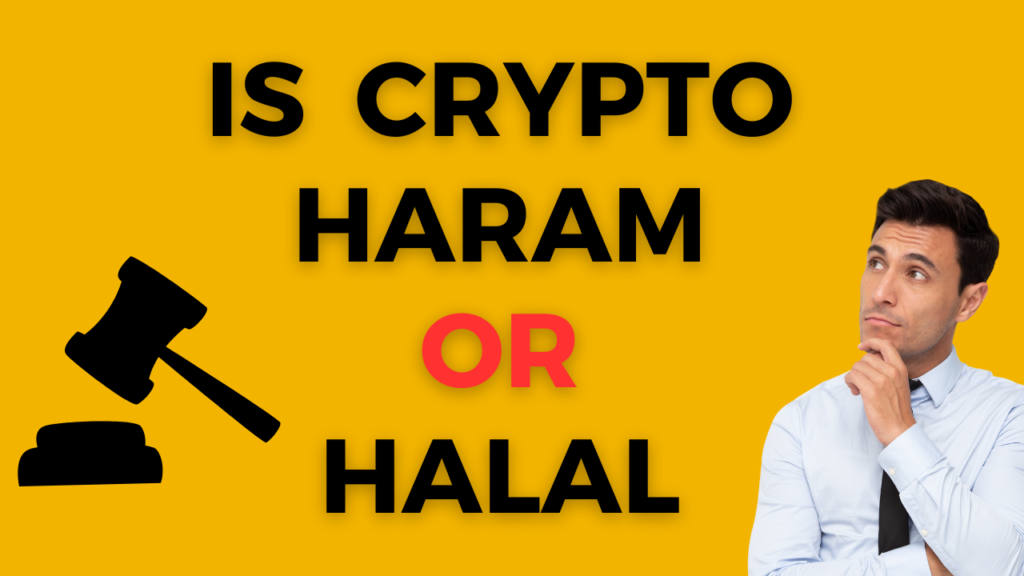The rapid rise of cryptocurrencies has sparked widespread debate, including within the Muslim community, regarding their compatibility with Islamic principles and if it is halal or haram to deal in cryptocurrencies. Given the increasing popularity and potential impact of cryptocurrencies, it is important to explore whether they align with the teachings of Islam and decide whether it is halal or haram to trade and invest in them. This article aims to provide an in-depth analysis of the key arguments surrounding the question: “Is cryptocurrency halal or haram in Islam?”
What is the Islamic Financial System
The Islamic financial system operates based on a set of moral and ethical principles that determine what is morally ‘right’ and ‘wrong’, encompassing actions and transactions that promote public good or are likely to be against it. While it is often simplified as “interest-free”, this description fails to capture the entirety of the system and can lead to confusion regarding halal or haram products.
The core principle of the Islamic financial system is the prohibition of interest, but it is supported by other principles derived from Islamic teachings about halal and haram. These principles include advocating for individuals’ rights and duties, upholding property rights, promoting equitable distribution of wealth, encouraging risk-sharing, emphasizing fulfillment of obligations, and valuing the sanctity of contracts.
Islamic finance, in essence, can be seen as a form of ethical investing or lending, with the key distinction that loans are interest-free. The objectives (Maqsid) of Islamic finance transactions can be summarized as follows:
- Adherence to Shari’ah principles of equity and justice.
- Avoidance of unjust enrichment.
- Consensus and true consent of all parties involved.
- Integral connection to real trade or economic activities, such as sales, leases, manufacturing, or partnerships.
The principles and objectives of the Islamic financial system aim to preserve the context of ethics and justice while aligning with the principles of Islamic teachings.
Islamic Principles Pertaining to Finance
Islamic finance is governed by principles derived from the Quran, Hadith (teachings of the Prophet Muhammad PBUH), and Islamic jurisprudence (Fiqh). Key principles include the prohibition of usury (Riba), uncertainty (Gharar), gambling (Maysir), and illicit activities. Transactions must be based on fairness, transparency, and real economic activity to remove the confusion of Halal or Haram.
Understanding Cryptocurrency and Whether it is Halal or haram:
Cryptocurrencies, such as Bitcoin, Ethereum, and others, are digital or virtual currencies that employ cryptography for secure financial transactions. They operate on decentralized networks called blockchains, which eliminate the need for intermediaries like banks. This decentralized nature is often cited as one of the significant advantages of cryptocurrencies.
These are very different from traditional forms of currency issued by governments. The most well-known cryptocurrency is Bitcoin, which was introduced in 2009, but there are now thousands of different cryptocurrencies available. Cryptocurrencies offer several unique features including increased security, transparency, and the potential for financial inclusivity.
Furthermore, cryptocurrencies have the potential to provide financial services to individuals who lack access to traditional banking systems, thus promoting financial inclusivity on a global scale. However, it is essential to recognize the inherent risks associated with cryptocurrencies, such as price volatility and the potential for illegal activities, including money laundering and illicit transactions.
Comparison of Cryptocurrency and Fiat Currency
Cryptocurrency and fiat currency share certain similarities. They both serve as forms of payment and storage of value. Moreover, both can be undermined by a lack of consumer confidence and trust.
On the other hand, there are notable differences between the two:
Fiat currencies are centralized, with control resting typically in the hands of central banks or governments, cryptocurrencies are decentralized. The absence of a single controlling entity is a defining feature of cryptocurrencies, thanks to their peer-to-peer network.
Cryptocurrency transactions are irreversible, setting them apart from fiat money. Fiat currencies can be forcibly reversed, but once a cryptocurrency transaction is completed, it cannot be undone.
Fiat money is subject to inflation and can be haphazardly modified or even abolished by governments or central banks. Conversely, cryptocurrencies have a fixed supply, which cannot be altered.
In summary, despite some similarities, the decentralized nature of cryptocurrencies and their irreversible transactions distinguish them from centralized and reversible fiat currencies. Additionally, cryptocurrencies’ fixed supply sets them apart from the volatile nature of fiat money. These features of both cryptocurrency and fiat currency bring them under the debate of Halal or Haram by the Muslims.
Arguments in Favor of Cryptocurrency being Halal:
Currency as a Medium of Exchange: Proponents argue that cryptocurrencies can be considered as a medium of exchange, fulfilling one of the essential functions of money in an increasingly digital world.
Decentralization and Transparency: The decentralized nature of cryptocurrencies aligns with Islamic principles, as it eliminates the concentration of power in centralized financial institutions and promotes transparency.
Utility and Technological Advancement: Supporters argue that cryptocurrencies possess utility and can facilitate cross-border transactions, financial inclusion, and economic empowerment, especially in regions with limited access to traditional banking systems.
Arguments Against Cryptocurrency being Halal:
Lack of Tangibility: Critics contend that cryptocurrencies lack physical existence and are not backed by tangible assets, making them incompatible with Islamic principles, which emphasize real economic activity and value.
Speculation and Gambling: The volatility and speculative nature of cryptocurrencies have led some scholars to liken them to gambling (Maysir) and highlight the potential for excessive risk-taking and wealth concentration.
Uncertainty and Gharar: The lack of regulatory oversight and the complex nature of cryptocurrencies raise concerns about uncertainty (Gharar) in transactions, as it is challenging to determine the true value and risk associated with them.
Why do some Muslims consider cryptocurrencies Haram?
Cryptocurrency, such as Bitcoin, has been a topic of debate within the Muslim community regarding its permissibility according to Islamic principles. Several reasons are cited by Muslims who consider cryptocurrencies Haram:
High-Risk Investment Resembling Gambling:
One of the primary concerns raised by Muslims in the Halal or Haram debate, is the resemblance of cryptocurrency investment to gambling, which is prohibited in Islam. Unlike traditional currencies, the value of cryptocurrencies is highly volatile and subject to rapid fluctuations based on market demand. The significant price swings experienced by cryptocurrencies, such as Bitcoin, exemplify this volatility. Such uncertainty and speculation are considered akin to gambling, which goes against Islamic teachings.
Cryptocurrency’s Distinction from Money:
According to some scholars, cryptocurrency does not fulfill the criteria of being considered as money. Money, as defined in Islamic finance, should serve as a medium of exchange for goods and services. However, cryptocurrency is predominantly viewed as an investment or speculative asset rather than a widely accepted currency for day-to-day transactions. Some mainstream banks have even shifted their terminology to “cryptoassets” to differentiate between traditional money and cryptocurrency. Islam emphasizes that money should be based on physical assets and have real-world utility, whereas the limited usability of cryptocurrencies as a medium of exchange raises concerns about its compliance with Islamic principles and whether it is Halal or Haram.
The Matter of Fiscal Value of Cryptocurrencies:
All Islamic scholars who deem cryptocurrencies permissible affirm their possession of value.
According to Mufti Faraz, “Cryptocurrencies currently possess monetary utility, with individuals attributing value to Bitcoins through their purchase, sale, acceptance, and exchange. Although the value of these assets can be influenced, manipulated, and speculated upon, such external matters necessitate regulation and control.”
Even Ibrahim Khan, who holds reservations about cryptos as currencies due to the aforementioned reasons, acknowledges their inherent worth.
“Cryptocurrencies possess an inherent worth, evident in the significant monetary investments made by individuals and the widespread acceptance of digital currencies as a means of payment by businesses,” he stated.
“While it is accurate to perceive a ‘bitcoin’ as a ledger entry lacking substantial intrinsic value, the same can be said for physical pounds and notes. Yet, we universally accept them as legitimate currency. Ultimately, value is derived from the significance we assign to things. If a considerable number of individuals value Bitcoin, then it holds value!”
The Ambiguity of Regulation: Implications for Halal or Haram Status
The lack of comprehensive regulation for cryptocurrencies is a significant aspect contributing to the perception of their compliance, or lack thereof, with Islamic principles. Some Muslims argue that if cryptocurrencies were subject to better regulation by governments and financial institutions, they could potentially be considered permissible (Halal) in Islam. Regulatory oversight would address concerns related to uncertainty (Gharar) and help mitigate the risks associated with unregulated transactions. While efforts are underway in several countries, including the United States, to introduce regulations for cryptocurrencies, it is noteworthy that no Muslim-majority country has currently legalized their use for transactions, adding to the ongoing debate surrounding their Halal or Haram status.
Scholarly Perspectives:
Islamic scholars have expressed a range of opinions regarding the permissibility of cryptocurrencies. Some argue for their permissibility, citing their potential benefits in promoting financial inclusion and economic development. Others take a more cautious approach, urging strict adherence to Islamic principles and the need for regulatory oversight.
Regulatory Initiatives:
Recognizing the need to address the compatibility of cryptocurrencies with Islamic finance, some countries with significant Muslim populations, such as the United Arab Emirates and Malaysia, have taken steps to regulate and provide guidelines for cryptocurrency transactions that adhere to Islamic principles.
Key Takeaways on Cryptocurrency being Halal or Haram
- Within the realm of Islamic scholarship, there exists a continuing debate surrounding the permissibility of cryptocurrency, with differing viewpoints on whether it is considered halal.
- For those who deem it impermissible, several key factors are taken into account, such as the potential utilization of cryptocurrency for illicit activities, the absence of a central authority governing its transactions, its speculative nature, and its limited acceptance as a medium of exchange.
- On the other hand, proponents of halal cryptocurrency argue that it possesses the characteristics of Mal, lacks the presence of interest (Riba), and contend that its association with unlawful activities does not inherently render it haram.
- Additionally, questions persist regarding the regulation of cryptocurrencies, widespread acceptance as a medium of exchange, as well as concerns surrounding their volatility — matters that are pertinent and influential to all individuals within the discussion.
Concluding Thoughts
The question of whether cryptocurrency is halal or haram in Islam remains a topic of ongoing discussion and interpretation. While some scholars argue for its compatibility with Islamic principles, others voice concerns about its lack of tangibility and speculative nature. As the field of cryptocurrency evolves and regulators continue to address its implications, a nuanced understanding of Islamic finance and ongoing scholarly discourse will be essential to determine its permissibility in accordance with Islamic teachings.




![How to Withdraw funds from MetaMask [2024]](https://www.cryptowinrate.com/wp-content/uploads/2024/06/Add-a-little-bit-of-body-text-1024x597.jpg)













